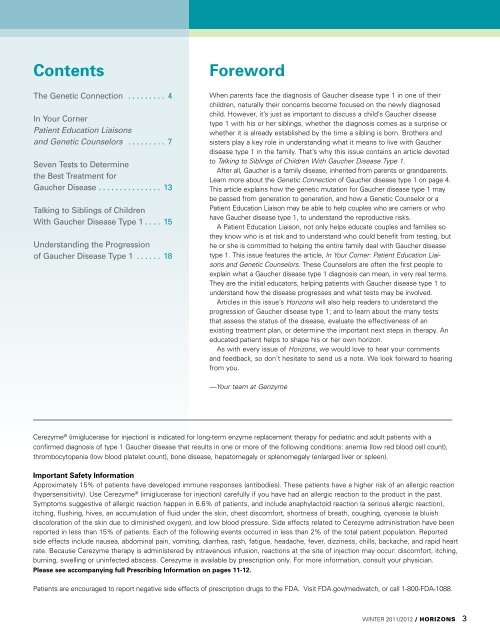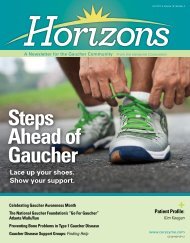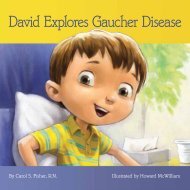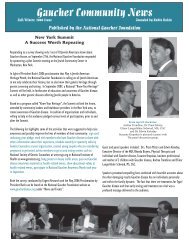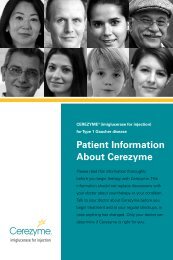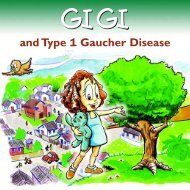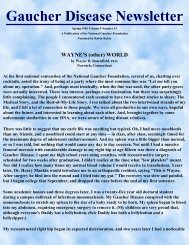Horizons Issue 3 2011 - National Gaucher Foundation
Horizons Issue 3 2011 - National Gaucher Foundation
Horizons Issue 3 2011 - National Gaucher Foundation
You also want an ePaper? Increase the reach of your titles
YUMPU automatically turns print PDFs into web optimized ePapers that Google loves.
Contents<br />
The Genetic Connection ......... 4<br />
In Your Corner<br />
Patient Education Liaisons<br />
and Genetic Counselors ......... 7<br />
Seven Tests to Determine<br />
the Best Treatment for<br />
<strong>Gaucher</strong> Disease ............... 13<br />
Talking to Siblings of Children<br />
With <strong>Gaucher</strong> Disease Type 1 .... 15<br />
Understanding the Progression<br />
of <strong>Gaucher</strong> Disease Type 1 ...... 18<br />
Foreword<br />
When parents face the diagnosis of <strong>Gaucher</strong> disease type 1 in one of their<br />
children, naturally their concerns become focused on the newly diagnosed<br />
child. However, it’s just as important to discuss a child’s <strong>Gaucher</strong> disease<br />
type 1 with his or her siblings, whether the diagnosis comes as a surprise or<br />
whether it is already established by the time a sibling is born. Brothers and<br />
sisters play a key role in understanding what it means to live with <strong>Gaucher</strong><br />
disease type 1 in the family. That’s why this issue contains an article devoted<br />
to Talking to Siblings of Children With <strong>Gaucher</strong> Disease Type 1.<br />
After all, <strong>Gaucher</strong> is a family disease, inherited from parents or grandparents.<br />
Learn more about the Genetic Connection of <strong>Gaucher</strong> disease type 1 on page 4.<br />
This article explains how the genetic mutation for <strong>Gaucher</strong> disease type 1 may<br />
be passed from generation to generation, and how a Genetic Counselor or a<br />
Patient Education Liaison may be able to help couples who are carriers or who<br />
have <strong>Gaucher</strong> disease type 1, to understand the reproductive risks.<br />
A Patient Education Liaison, not only helps educate couples and families so<br />
they know who is at risk and to understand who could benefit from testing, but<br />
he or she is committed to helping the entire family deal with <strong>Gaucher</strong> disease<br />
type 1. This issue features the article, In Your Corner: Patient Education Liaisons<br />
and Genetic Counselors. These Counselors are often the first people to<br />
explain what a <strong>Gaucher</strong> disease type 1 diagnosis can mean, in very real terms.<br />
They are the initial educators, helping patients with <strong>Gaucher</strong> disease type 1 to<br />
understand how the disease progresses and what tests may be involved.<br />
Articles in this issue’s <strong>Horizons</strong> will also help readers to understand the<br />
progression of <strong>Gaucher</strong> disease type 1; and to learn about the many tests<br />
that assess the status of the disease, evaluate the effectiveness of an<br />
existing treatment plan, or determine the important next steps in therapy. An<br />
educated patient helps to shape his or her own horizon.<br />
As with every issue of <strong>Horizons</strong>, we would love to hear your comments<br />
and feedback, so don’t hesitate to send us a note. We look forward to hearing<br />
from you.<br />
—Your team at Genzyme<br />
Cerezyme ® (imiglucerase for injection) is indicated for long-term enzyme replacement therapy for pediatric and adult patients with a<br />
confirmed diagnosis of type 1 <strong>Gaucher</strong> disease that results in one or more of the following conditions: anemia (low red blood cell count),<br />
thrombocytopenia (low blood platelet count), bone disease, hepatomegaly or splenomegaly (enlarged liver or spleen).<br />
Important Safety Information<br />
Approximately 15% of patients have developed immune responses (antibodies). These patients have a higher risk of an allergic reaction<br />
(hypersensitivity). Use Cerezyme ® (imiglucerase for injection) carefully if you have had an allergic reaction to the product in the past.<br />
Symptoms suggestive of allergic reaction happen in 6.6% of patients, and include anaphylactoid reaction (a serious allergic reaction),<br />
itching, flushing, hives, an accumulation of fluid under the skin, chest discomfort, shortness of breath, coughing, cyanosis (a bluish<br />
discoloration of the skin due to diminished oxygen), and low blood pressure. Side effects related to Cerezyme administration have been<br />
reported in less than 15% of patients. Each of the following events occurred in less than 2% of the total patient population. Reported<br />
side effects include nausea, abdominal pain, vomiting, diarrhea, rash, fatigue, headache, fever, dizziness, chills, backache, and rapid heart<br />
rate. Because Cerezyme therapy is administered by intravenous infusion, reactions at the site of injection may occur: discomfort, itching,<br />
burning, swelling or uninfected abscess. Cerezyme is available by prescription only. For more information, consult your physician.<br />
Please see accompanying full Prescribing Information on pages 11-12.<br />
Patients are encouraged to report negative side effects of prescription drugs to the FDA. Visit FDA.gov/medwatch, or call 1-800-FDA-1088.<br />
Please see accompanying full Prescribing Information.<br />
Winter <strong>2011</strong>/2012 / <strong>Horizons</strong> 3


